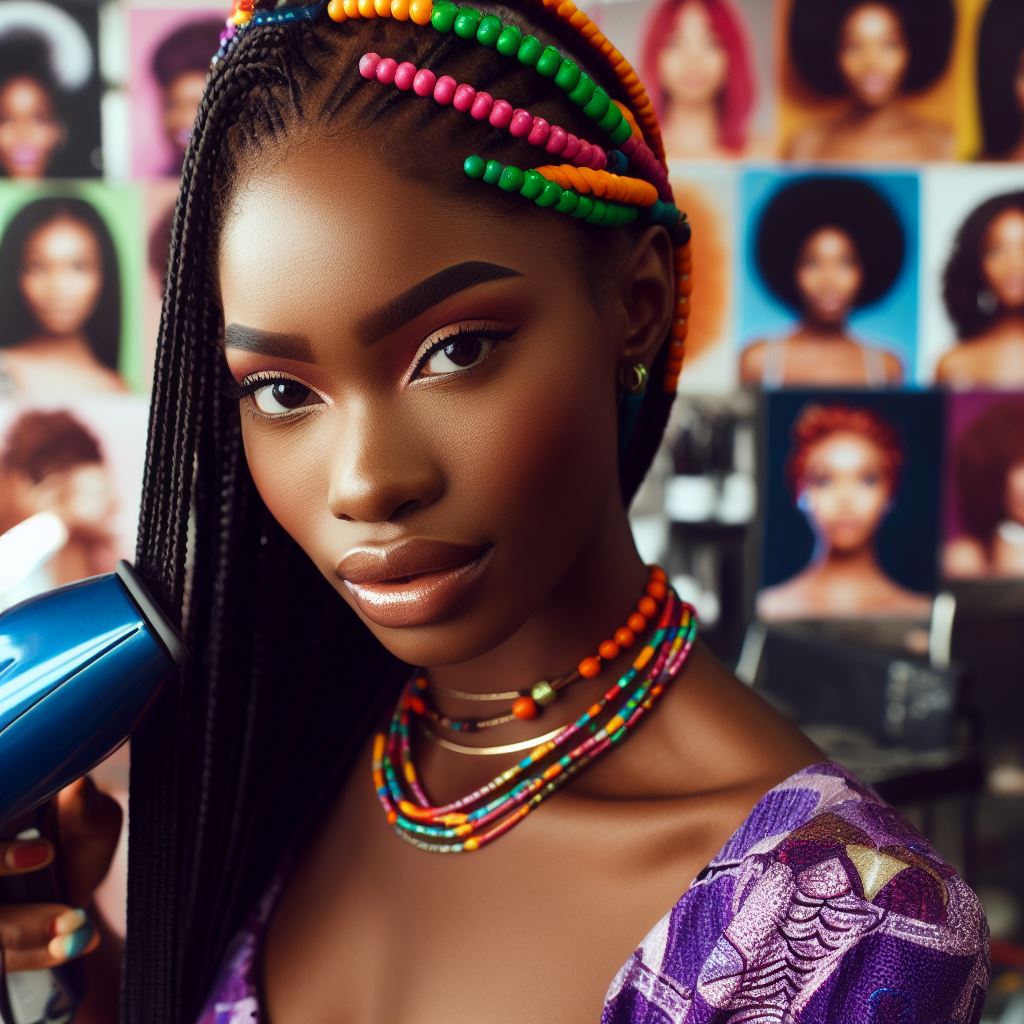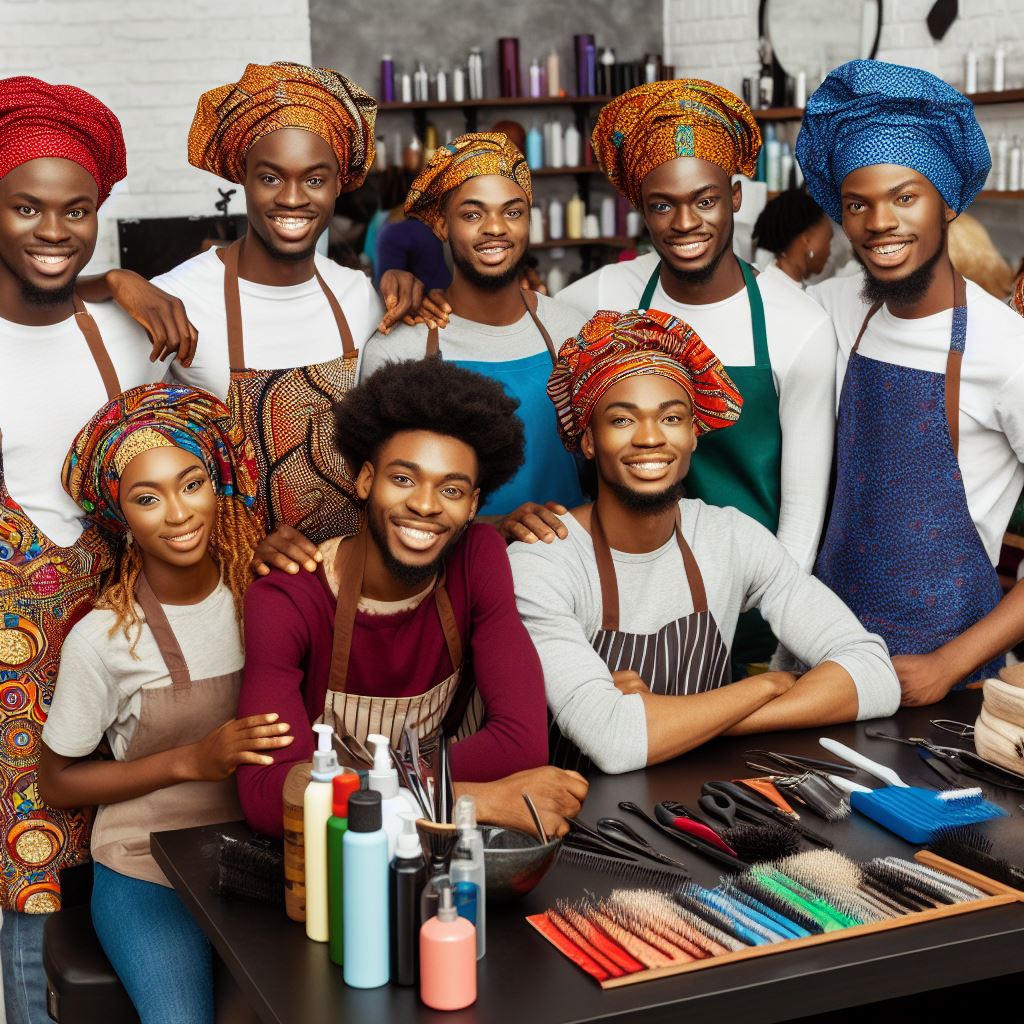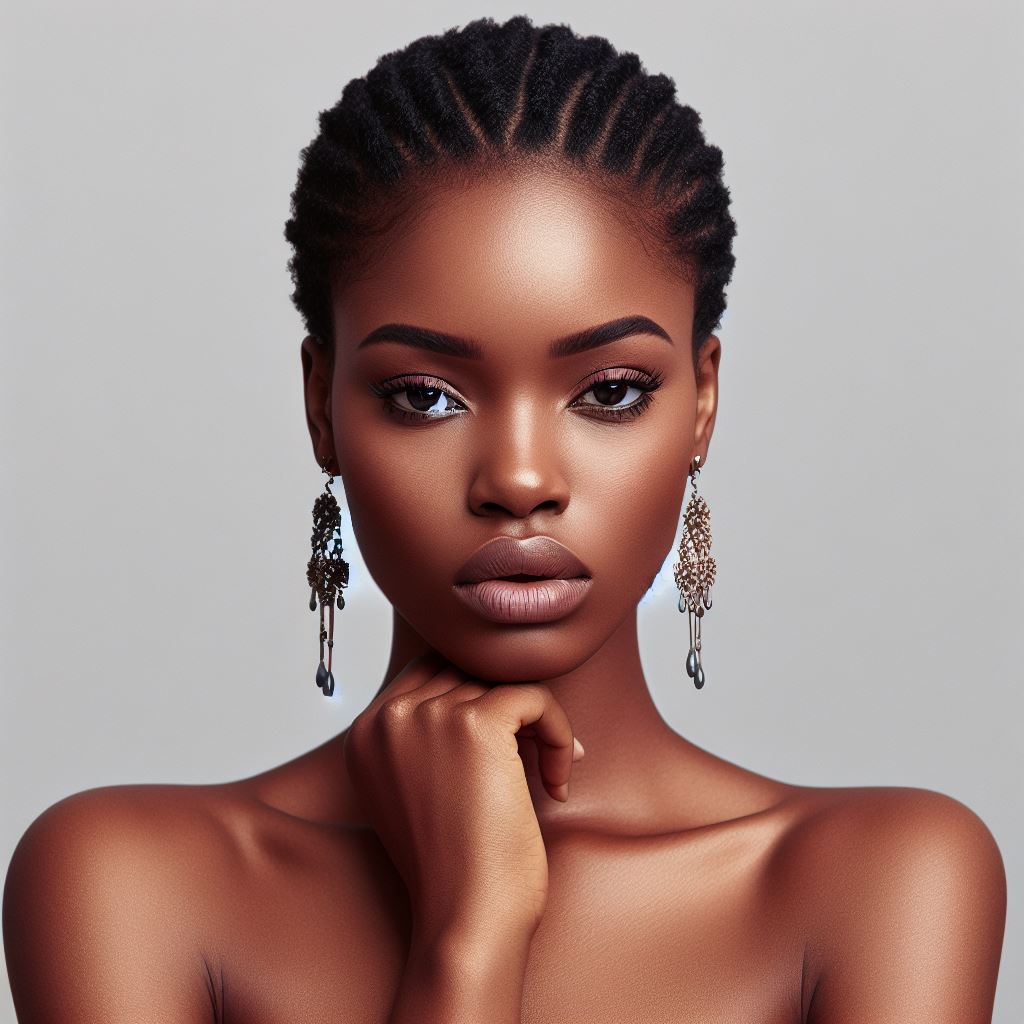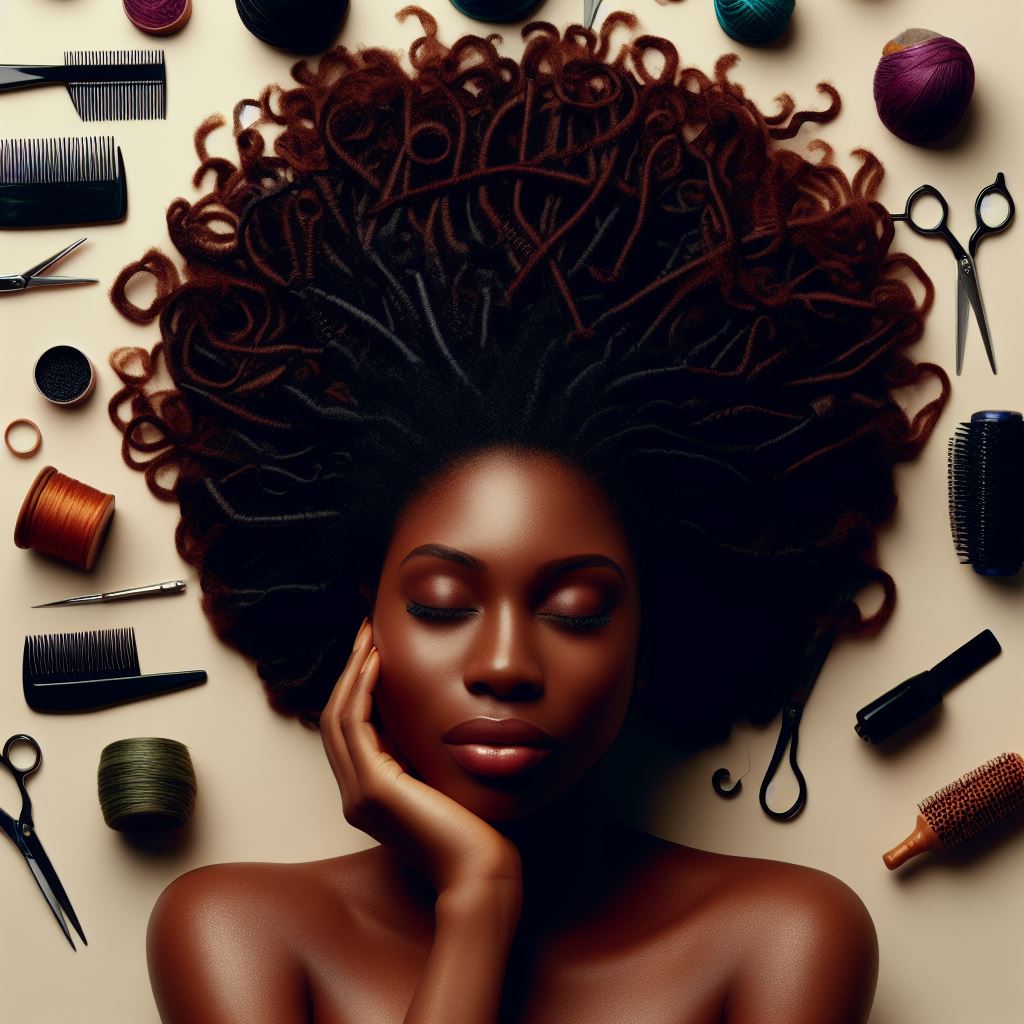Introduction
In Nigeria, the art of hair styling transcends mere aesthetics; it embodies cultural richness and personal expression.
This blog post endeavors to serve as a definitive guide to the intricate world of hair styling in this diverse nation.
Embark on a journey through the nuanced tapestry of Nigerian hair culture, where each braid and twist tells a unique story.
From traditional styles deeply rooted in heritage to contemporary trends shaping personal identities, explore the vibrant spectrum of creativity within the Hair Styling Profession in Nigeria.
Discover the techniques, trends, and the cultural significance that weave together to form the fabric of this dynamic profession, celebrating the artistry that adorns the heads of a nation.
History of Hair Styling in Nigeria
A. Traditional Nigerian Hairstyles and Their Significance
- Comb coils: Symbolized royalty and served as a protective style for natural hair.
- Bantu knots: Represented a sense of community and celebrated African heritage.
- Gele: A headwrap worn by Nigerian women, showcasing elegance, culture, and social status.
- Didi: Intricate and patterned braids that displayed creativity and cultural appreciation.
- Fulani braids: Reflecting Fulani culture, these braids were adorned with beads and cowrie shells.
B. Evolution of Hair Styling in Nigeria
- Colonial Influence: During the colonial era, Nigerian hairstyles were suppressed and considered inferior to European standards.
- Return to Roots: After Nigeria gained independence, there was a resurgence of traditional hair styling, promoting cultural pride.
- Western Influence: With the introduction of films and media, Nigerians embraced Western hairstyles and trends.
- Natural Hair Movement: In recent years, there has been a shift towards embracing natural hair textures and styles among Nigerians.
- Modern Innovations: The rise of social media and access to hair care products has led to experimentation with various hairstyles.
The captivating history of hair styling in Nigeria mirrors a tapestry of cultural richness and evolving trends.
From traditional comb coils symbolizing royalty to the intricate elegance of Gele headwraps, each style tells a unique story of identity and pride.
Bantu knots, Didi braids, and Fulani braids further celebrate unity, creativity, and cultural heritage.
Despite colonial suppression, Nigerians have boldly reclaimed their traditional hairstyles, blending them seamlessly with global influences.
In the contemporary era, a thriving natural hair movement is reshaping beauty standards and fostering self-acceptance.
The fusion of traditional and modern styles, propelled by social media and a plethora of hair care products, showcases Nigeria’s vibrant hair styling scene.
As the nation progresses, the rich heritage of Nigerian hair styling endures, reinforcing its significance in the evolving narrative of cultural identity.
Amidst this dynamic landscape, the hair styling profession in Nigeria has burgeoned into a flourishing industry.
Skilled artisans and stylists contribute to the preservation and innovation of traditional hairstyles while embracing the versatility of modern trends.
The profession not only serves as a creative outlet but also as a conduit for cultural expression, shaping the ever-evolving story of Nigeria’s diverse and vibrant hair culture.
Popular Hair Styling Techniques in Nigeria
In Nigeria, hair styling is not just a routine beauty practice, but a rich cultural tradition that reflects the diversity and heritage of the country.
Nigerian women have mastered various hair styling techniques over generations, and today, these styles continue to be popular and influential.
Here are some of the most commonly used techniques:
A. Braiding
Braiding is a versatile hair styling technique that involves weaving strands of hair together to create intricate patterns.
It is a time-consuming process but offers long-lasting results. Braids can be styled in various ways including box braids, micro braids, and cornrows.
Braiding holds significant cultural and aesthetic significance in Nigeria. It is not only a means of self-expression but also a way to showcase cultural identity and heritage.
Braiding styles often include intricate patterns and designs that symbolize traditions, rituals, or personal beliefs.
B. Weaving
Weaving involves adding hair extensions to create length and volume. The technique involves attaching the extensions to the natural hair using a weaving thread or adhesive.
Weaving can be done in different styles such as full weaves, partial weaves, or sew-in weaves.
Weaving has become increasingly popular in Nigeria as it provides versatility and allows for dramatic hairstyle transformations.
Many Nigerian women use weaving to experiment with different hair textures, colors, and styles that may not be achievable with their natural hair.
Weaving also offers protection to the natural hair, promoting growth and maintaining its health.
C. Cornrows
Intricate braids known as cornrows are created by tightly braiding the hair close to the scalp in a straight line or intricate patterns.
Cornrows can be worn alone or with other styling techniques, such as adding extensions or beads.
In Nigeria, cornrows have deep cultural significance, representing a bond between generations and communities.
They have traditionally been passed down from mothers to daughters, serving as a way to connect and preserve cultural heritage.
Cornrows are also adored for their aesthetic appeal, with various patterns symbolizing different meanings and personal stories.
These popular hair styling techniques in Nigeria not only enhance one’s beauty but also celebrate the country’s diverse culture and traditions.
The time, effort, and creativity put into these styles reflect the pride and identity of Nigerian women.
Whether it’s braiding, weaving, or cornrows, each technique holds its own cultural and aesthetic significance, making them an integral part of the Nigerian hair styling profession.
Training and Education for Hair Stylists in Nigeria
A. Pathways to Becoming a Hair Stylist in the Country
- Apprenticeship: Working under an experienced hair stylist to gain practical skills and knowledge.
- Self-teaching: Learning through online tutorials, books, and experimenting on oneself or friends.
- Enrolling in a formal hair styling training program.
B. Importance of Formal Education and Training
Formal education and training are crucial for hair stylists to develop the necessary skills and techniques:
- Learn proper sanitation practices to maintain a hygienic salon environment.
- Understand different hair types, textures, and their specific needs.
- Master various haircutting, coloring, and styling techniques.
- Develop salon management and customer service skills.
C. Availability of Vocational Schools and Courses
Aspiring hair stylists in Nigeria can pursue their dreams through vocational schools and courses:
- National Open University of Nigeria (NOUN): Offers cosmetology programs that include hair styling.
- University of Lagos: Provides vocational training courses in hairdressing.
- Lagos State Skill Acquisition Centers: Offer vocational courses in hair styling.
- Hairdressing and Beauty Therapy Association of Nigeria (HABITAN): Offers professional training programs.
- Private vocational schools: Numerous institutions that provide comprehensive hair styling training.
Nigerian hair stylist aspirants can choose the education and training pathway that suits their circumstances and goals.
Whether they prefer hands-on experience through apprenticeships or professional schooling, the key is to gain the necessary skills and knowledge to excel in the profession.
Read: A Deep Dive into Fundraising Legislation in Nigeria
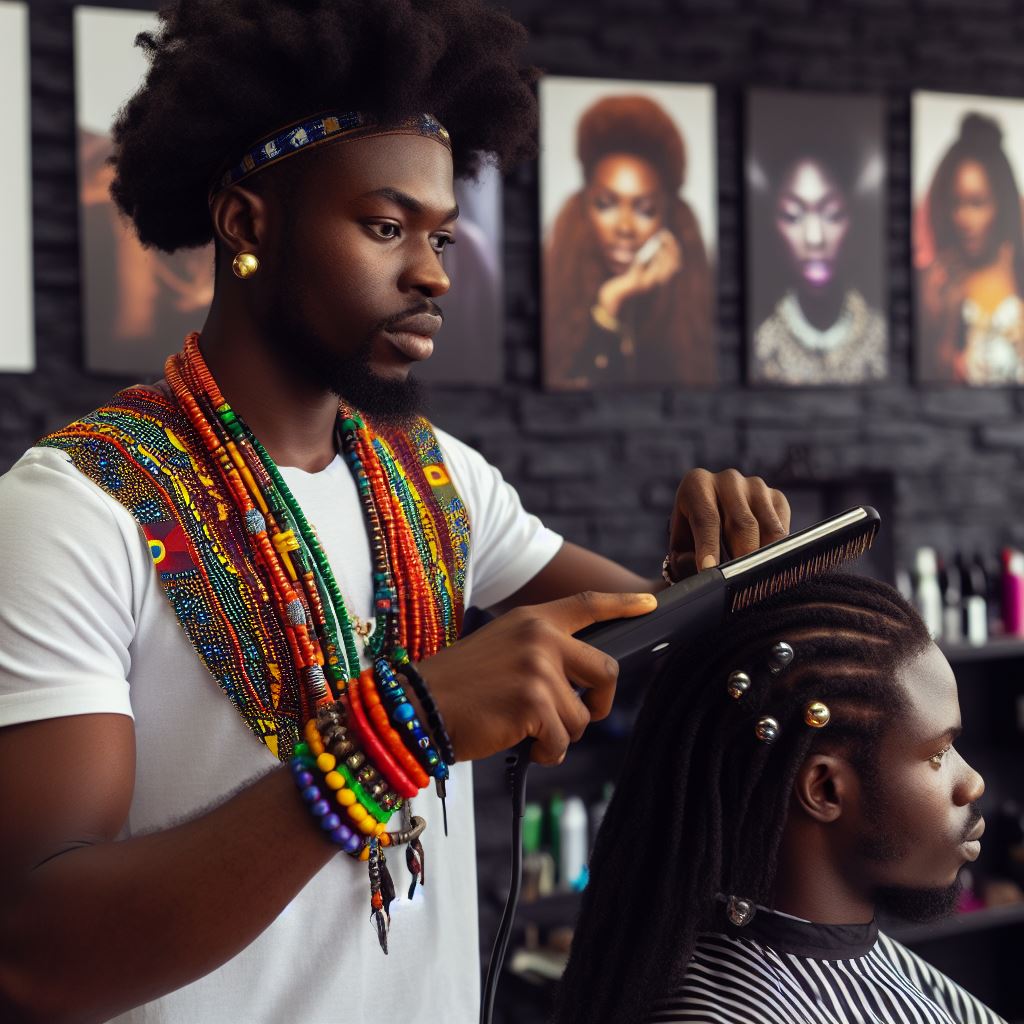
Challenges in the Hair Styling Profession in Nigeria
A. Lack of regulations and guidelines for hair stylists
- The hair styling profession in Nigeria faces a significant challenge due to the absence of regulations and guidelines.
- Without clear regulations, anyone can claim to be a hair stylist without any formal training or qualifications.
- This lack of regulation not only undermines the credibility of the profession but also puts the public at risk.
- Customers have no way of knowing if their chosen hair stylist has the necessary skills or knowledge to provide quality service.
- Furthermore, the absence of regulations prevents the establishment of industry standards, leading to inconsistencies in service quality across the country.
B. Issue of unqualified stylists and the potential risks involved
- One of the primary challenges in the Nigerian hair styling profession is the prevalence of unqualified stylists.
- Individuals with little to no training or experience often set up salons and start offering hair styling services.
- This situation poses significant risks to the health and well-being of customers.
- Unqualified stylists may lack knowledge of proper hygiene practices, leading to infections or the spread of diseases.
- Additionally, they may use substandard products or employ incorrect techniques, causing damage to the customers’ hair and scalp.
- The lack of awareness among the general public about the risks associated with unqualified stylists exacerbates the problem.
C. Need for standardized practices and licensing requirements
- Considering the challenges faced by the hair styling profession in Nigeria, there is an urgent need for standardized practices.
- Standardized practices can ensure that all hair stylists adhere to a set of guidelines to maintain quality and safety.
- Implementation of standardized practices would require collaboration between industry professionals, regulatory bodies, and government authorities.
- Additionally, introducing licensing requirements for hair stylists would help establish minimum competency levels in the profession.
- Licensing would require hair stylists to undergo formal training and demonstrate their proficiency before practicing professionally.
- By setting licensing requirements, potential risks associated with unqualified stylists can be significantly reduced.
- Moreover, a licensing system would give customers the confidence to choose certified and skilled hair stylists.
To overcome the challenges in the hair styling profession in Nigeria, the government and relevant stakeholders must take immediate action.
Clear regulations and guidelines need to be established to ensure the credibility and safety of the profession.
Unqualified stylists should be discouraged, while standardized practices and licensing requirements should be implemented to promote professionalism.
Only through these measures can the hair styling profession in Nigeria thrive and provide high-quality services to its customers.
Read: Fundraising Education in Nigeria: What to Know
Explore Further: Tech in HR: Tools Used in Nigeria’s Industry
See Related Content: Managing Stress: A Hotel Receptionist’s Handbook
Opportunities and Success Stories in the Hair Styling Profession in Nigeria
A. Successful Nigerian hair stylists who have made a name for themselves
- Olabisi Olayinka: Known for her intricate braiding techniques, Olabisi has styled celebrities and won several awards.
- Emeka Okafor: His unique hairstyles have been featured in fashion magazines and he has a loyal client base.
- Chinwe Onyekwe: A master of natural hair styling, Chinwe’s work has been showcased in local and international events.
- Abubakar Ibrahim: With his exquisite updos, Abubakar has become the go-to stylist for weddings and special occasions.
- Sade Adeleke: Sade specializes in wig making and has her own line of customized wigs that are highly sought after.
B. The lucrative nature of the profession
The hair styling profession in Nigeria is highly lucrative, with opportunities for stylists to make a substantial income.
With the demand for unique and trendy hairstyles increasing, stylists who deliver quality services can charge premium prices.
Additionally, the profession allows for creativity and self-expression, making it a fulfilling and financially rewarding career choice.
C. Potential for growth and entrepreneurship in the industry
In the vibrant landscape of Nigeria, the hair styling industry is more than just a profession—it’s a dynamic realm of growth and entrepreneurial potential.
As Nigeria’s population burgeons, so does the demand for professional hair services. Skillful stylists, armed with creativity and business acumen, can carve their niche in this burgeoning market.
The surge of social media opens up new avenues for these stylists to flaunt their artistry, attracting a broader clientele.
In this section, we delve into the success stories shaping the narrative of the “Hair Styling Profession in Nigeria.”
Meet visionaries like Olabisi Olayinka, renowned for her intricate braiding; Emeka Okafor, a trendsetting experimentalist; Chinwe Onyekwe, defying beauty norms with natural styling; Abubakar Ibrahim, crafting elegance for special occasions; and Sade Adeleke, dominating the wig-making realm.
These stories not only showcase talent but underscore the lucrative nature of a career in hair styling, beckoning aspiring stylists to join the league of creativity and beauty.
Read: International Views: Fundraising in Nigeria Compared
Tips for Aspiring Hair Stylists in Nigeria
A. Practical Advice
- Gain proper training and education in hair styling techniques and trends.
- Intern or assist established stylists to gain practical experience and learn from professionals.
- Invest in quality hair styling tools and products to provide the best services to clients.
- Develop good communication and interpersonal skills to understand and fulfill client’s expectations.
- Develop a strong work ethic, be punctual, and maintain professionalism in all aspects of your career.
- Network with other hairstylists and professionals in the beauty industry to expand your opportunities.
- Keep a positive attitude, be open to feedback, and never stop learning and improving your skills.
B. Continuous Learning and Staying Updated
- Stay updated with the latest hair styling techniques, trends, and products by attending workshops, seminars, and conventions.
- Follow influential hair stylists and industry experts on social media platforms to stay informed about new styles and techniques.
- Subscribe to professional hair styling magazines or online publications to keep up with the latest industry news.
- Join online forums or hair styling communities to engage with other professionals and learn from their experiences.
- Experiment with different styles and techniques to expand your repertoire and stay ahead of the competition.
- Take additional courses or certifications in specialized areas like bridal styling or natural hair care to attract a wider range of clients.
C. Building a Strong Portfolio and Attracting Clients
- Document your work by taking high-quality photos of your hairstyles to showcase your talent and range.
- Collaborate with photographers, models, and makeup artists to create professional photoshoots for your portfolio.
- Share your portfolio on social media platforms and create a professional website to attract potential clients.
- Offer free or discounted services to friends and family members to build your portfolio and gain references.
- Provide excellent customer service and ensure client satisfaction to generate positive word-of-mouth referrals.
- Offer specialized services or cater to niche markets like natural hair care or specialized occasion styling to attract specific clientele.
Remember, success in the hair styling profession requires dedication, passion, and continuous growth.
By following these tips and constantly learning and improving, you can forge a successful career in hair styling in Nigeria.
Read: Building Trust: Transparency in Fundraising in Nigeria
Conclusion
In this blog post, we explored the world of hair styling in Nigeria, highlighting its rich cultural significance.
We discussed the key points, such as the growing demand for hair stylists and the various techniques used.
It is evident that the hair styling profession plays a vital role in Nigerian society, providing employment opportunities and contributing to cultural identity.
As readers, we should appreciate and celebrate the artistry and skill of hair stylists, acknowledging their immense contribution to our cultural heritage.
With an array of styles and techniques to explore, we encourage readers to embrace the world of hair styling and understand its cultural importance.
By supporting and respecting the hair styling profession in Nigeria, we can help preserve and promote our shared cultural heritage.

